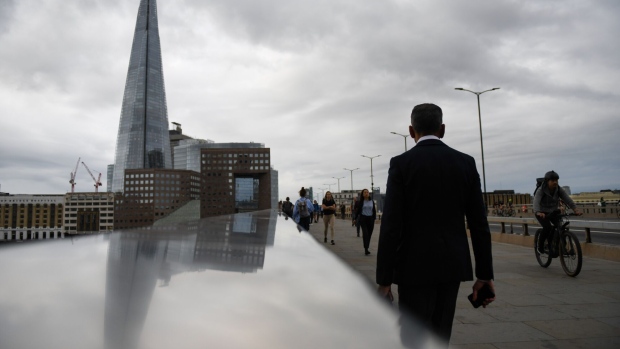Oct 14, 2023
Bailey Says Workforce Dropouts Hit UK’s Growth and Stoke Prices
, Bloomberg News

(Bloomberg) -- Changing attitudes to work since the pandemic and sluggish business investment have hit the UK’s economic capacity and kept inflation elevated, Bank of England chief Andrew Bailey said.
Speaking to an audience of central bankers hosted by the Group of 30 in the Moroccan city of Marrakech, he said potential growth in Britain has fallen from 2.25%-2.5% in the past to “at best, 1.5%.”
“That complicates monetary policy,” Bailey observed. He also signaled that interest rates are likely remain at around the current 5.25% as policy “has to be restrictive” to get inflation back to 2%. “The last mile will be the hardest,” he warned.
Fourteen successive increases in borrowing costs are “having an effect” and “there has been some good news on inflation lately,” the governor added. Money markets show traders see rates are at or close to their peak.
The BOE kept policy unchanged last month, in its first pause since tightening began in December 2021. However, inflation remains way above the 2% target, at 6.7%, and policymakers were split over the decision.
The governor cited two reasons for the reduction in Britain’s growth potential — labor markets and business investment — and urged Rishi Sunak’s government to press ahead with supply-side reforms to lift the country’s economic capacity.
The UK has suffered an unusually large labor-market hit when compared with other advanced peers. Inactivity among the employment-age population has increased by 410,000 since Covid, and total hours worked are still below pre-pandemic levels.
While labor participation has fallen in the UK, it has risen across much of Europe. Britain’s problems have been driven by rising numbers of people classed with long-term sickness, a tally up by 500,000 since 2019 at 2.6 million. Much of the increase is related to mental health.
“We have seen, in the UK, a withdrawal of labor supply,” Bailey said. “I think Covid has changed people’s attitudes to the way they participate in the labor market – and we have to come to terms with that, and understand its implications.”
Bailey also called on the UK pensions industry to “play its part in investing in private-sector assets.” Jeremy Hunt, the chancellor, has said he wants business investment to rise to the European average, which would mean about £25 billion ($30.4 billion) more ever year.
He has agreed a “compact” with some pension funds to devote more of their resources into private assets, like start-ups and infrastructure, and is pressing the industry to do more.
Bailey said more investment is needed to boost the UK’s low productivity rate, saying the pension industry could act.
“There is an important role for it in supporting private investment,” he said.
(Updates with comments staritng in third paragraph)
©2023 Bloomberg L.P.






